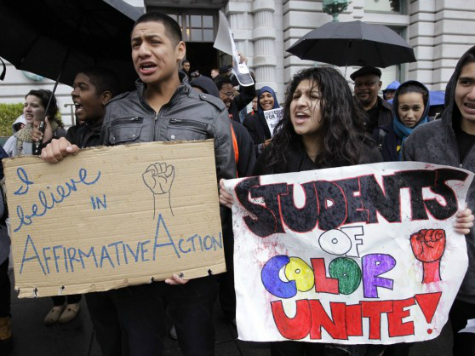
This decade’s biggest racial-preference case may be heading for a second round in the U.S. Supreme Court, as a federal appeals court yesterday narrowly sided with the University of Texas (UT) granting preferential treatment based on skin color.
Abigail Fisher was denied admission to UT, and sued on the grounds that other students were given preferential treatment to her if they were black or Hispanic, and that such racial preferences violates the Fourteenth Amendment’s Equal Protection Clause.
Breitbart News reported in 2013 on Fisher v. Univ. of Texas at the Supreme Court, which dealt a blow to racial preferences, sending the case back to the lower court with instructions to apply “strict scrutiny.” That is a demanding standard under which the government’s law or program is presumed unconstitutional, and will only be upheld if the government can prove it is narrowly tailored to achieve a compelling public interest.
On July 15, 2014, the U.S. Court of Appeals for the Fifth Circuit sided with UT again by a 2-to-1 vote. The majority wrote, “Narrow tailoring requires that the court verify it is necessary to a university to use race to achieve the educational benefits of diversity.” In other words, “the reviewing court must be satisfied that no workable race-neutral alternatives would produce the educational benefits of diversity.”
Yet then the three-judge panel accepted UT’s argument of what constituted achieving a “critical mass” of minority students to convey what the Supreme Court in previous cases (when the Court was much more liberal) had upheld as a compelling interest of having a diverse student body. The New Orleans-based appeals court thus held UT’s program satisfies strict scrutiny.
Judge Emilio Garza dissented. He wrote about how the Supreme Court in this case clarified in 2013 that strict scrutiny must be truly strict. Specifically, “reviewing courts cannot defer to a state actor’s argument that its consideration of race is narrowly tailored to achieve its diversity goals.” Garza goes on to say that while UT “articulated its goal as a critical mass” of sufficient minority students to impact classroom discussion, “surprisingly, it has failed to define this term in any objective manner.”
Since the appeals court was upholding UT’s policy despite UT not offering any objective standard for measuring the benefits of diversity:
the majority continues to defer impermissibly to the University’s claims. This deference is squarely at odds with the central lesson from Fisher. A proper strict scrutiny analysis, affording the University no deference on its narrow tailoring claims, compels the conclusion that the University’s race-conscious admissions process does not survive strict scrutiny.”
Lawyers representing Fisher will now petition the full Fifth Circuit to rehear the case in what is called an en banc sitting, or can petition the Supreme Court to take this case a second time, where there is a significant chance Abigail Fisher could prevail.
Ken Klukowski is senior legal analyst for Breitbart News. Follow him on Twitter @kenklukowski.

COMMENTS
Please let us know if you're having issues with commenting.